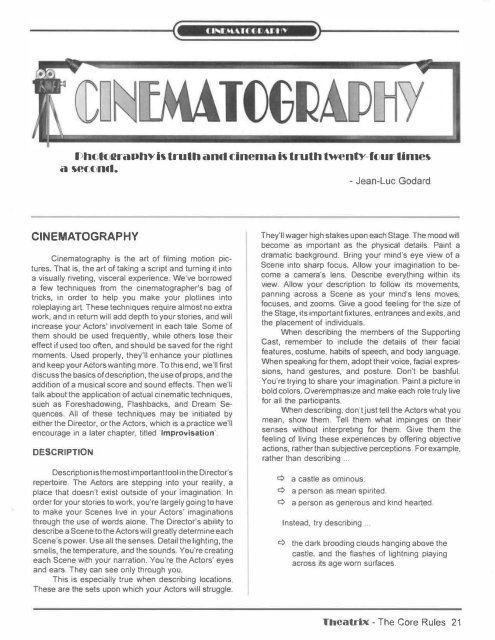Untitled - Index of - Free
Untitled - Index of - Free
Untitled - Index of - Free
You also want an ePaper? Increase the reach of your titles
YUMPU automatically turns print PDFs into web optimized ePapers that Google loves.
(CO.-<br />
Vh()t()flraPhY ii truth and .::lnema is tnJth twenb'-f()ur times<br />
a sec()nd.<br />
CINEMATOGRAPHY<br />
Cinematography is the art <strong>of</strong> filming motion pic<br />
tures. That is, the art <strong>of</strong> taking a script and turning it into<br />
a visually nveting, visceral experience. We've borrowed<br />
a few techniques from the cinematographer's bag <strong>of</strong><br />
tricks, in order to help you make your plotlines into<br />
roleplaytng art. These techniques require almost no extra<br />
work, and in return will add depth to your stories, and will<br />
increase your Actors' involvement tn each tale. Some <strong>of</strong><br />
them should be used frequently, while others lose their<br />
effect if used too <strong>of</strong>ten, and should be saved for the right<br />
moments Used properly, they'll enhance your plotlines<br />
and keep your Actors wanting more. To this end, we'll first<br />
d1scuss the basics <strong>of</strong> description, the use <strong>of</strong> props, and the<br />
addition <strong>of</strong> a musical score and sound effects. Then we'll<br />
talk about the application <strong>of</strong> actual cinematic techniques,<br />
such as Foreshadowing, Flashbacks, and Dream Se<br />
quences All <strong>of</strong> these techniques may be initiated by<br />
either the Director, or the Actors, which is a practice we'll<br />
encourage in a later chapter, titled 'Improvisation'.<br />
DESCRIPTION<br />
Descnptton is the most Important tool in the Dtrector's<br />
repertoire The Actors are stepping into your reality. a<br />
place that doesn't exist outside <strong>of</strong> your Imagination. In<br />
order for your stones to work, you're largely going to have<br />
to make your Scenes live 1n your Actors' imaginations<br />
through the use <strong>of</strong> words alone. The Director's ability to<br />
describe a Scene to the Actors will greatly determine each<br />
Scene's power Use all the senses. Detail the lighting, the<br />
smells, the temperature, and the sounds. You're creating<br />
each Scene with your narration. You're the Actors' eyes<br />
and ears. They can see only through you.<br />
Thts is especially true when describing locations.<br />
These are the sets upon whtch your Actors will struggle.<br />
- Jean-Luc Godard<br />
They'll wager high stakes upon each Stage. The mood will<br />
become as important as the physical details. Paint a<br />
dramatic background. Bring your mind's eye view <strong>of</strong> a<br />
Scene into sharp focus. Allow your imagination to be<br />
come a camera's lens. Describe everything within its<br />
view. Allow your description to follow rts movements<br />
panning across a Scene as your mind's lens moves:<br />
focuses, and zooms. Give a good feeling for the s1ze <strong>of</strong><br />
the Stage, its important fixtures. entrances and exits, and<br />
the placement <strong>of</strong> tndividuals.<br />
When describing the members <strong>of</strong> the Supporting<br />
Cast, remember to Include the details <strong>of</strong> their facial<br />
features, costume, habtts <strong>of</strong> speech, and body language.<br />
When speaking for them, adopt their voice, facial expres<br />
sions, hand gestures, and posture. Don't be bashful.<br />
You're trying to share your imagination. Paint a picture tn<br />
bold colors. Overemphasize and make each role truly live<br />
for all the participants.<br />
When describing, don't just tell the Actors what you<br />
mean, show them. Tell them what impinges on their<br />
senses without interpreting for them. Gtve them the<br />
feeling <strong>of</strong> living these experiences by <strong>of</strong>fering objective<br />
actions, rather than subjective perceptions. For example,<br />
rather than describing .<br />
a castle as ominous<br />
a person as mean spirited<br />
a person as generous and kind hearted<br />
Instead, try describing ...<br />
the dark brooding clouds hanging above the<br />
castle, and the flashes <strong>of</strong> lightning playtng<br />
across its age worn surfaces.<br />
Theatrlx- The Core Rules 21



